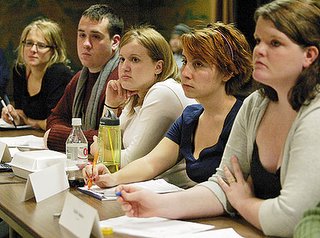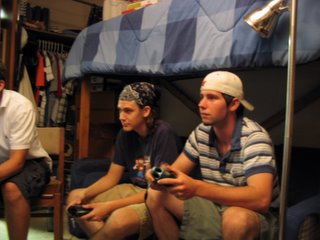
Since last spring, conservatives have been winning major victories on campus. There have been several special triumphs to note.
One, we have one of the first conservative chairs in Eric Varney and the campus and conservatives have have benefited from having an objective mouthpiece and leader of the organization. Varney’s response to UW’s Party School Ranking:
“It just shows that we work hard, but we play hard also” Someone that is honest and not a tool for political correctness is someone I can definitely respect.”
Varney’s response to SSFC’s decision on SAFE:
“University of Wisconsin Transportation blatantly failed to follow the proper procedures, resulting in the end of a valuable and popular service in SAFE Cab. Shame on them.”
“Last year, SAFE Cab provided 13,100 rides to students in need, while SAFE Walk only had 1,075 uses. At budget costs of roughly $194,000 and $116,000 respectively, it is apparent that SAFE Cab is a more cost effective and widely used service than its counterpart. SAFE Walk is an important program as well, but it puzzles me why UW Transportation would tout one service so highly over the other, especially with contradictory statistics.”
Instead of making an apology to the students about SAFE, he criticized UW Transportation. This was a great political move and one that garners my respect. Having someone at the top who knows what government should be about (providing essential services) and not about social activism has been great. While Varney has not been extraordinarily active this semester, he has been a good spokesperson, a fair chairman, spoke out in favor of SSFC’s decision on SAFE, and most importantly filed the lawsuit against SLAC.
Second, the Robin Hood Slate won a number of races in a convincing fashion that should not go unnoticed. In the spring, Ryan Scannell whooped up on the competition in the Agricultural Race (600 to 90) and sent Eyal packing (this had other implications also). Brandon Sivet led the way in the L&S with the most votes for the school, Jackie Goessl represented in Education, Ross Olson picked up the spot for the SON, I picked up over 1700 votes in the SSFC race, and others won in convincing fashion in their respective schools. The fall freshman race was even more exciting. Even though the CR’s decided to endorse one of the two conservative candidates, both won dominating other representatives who claimed their racial diversity made them “the” candidate for council. This huge win along with upcoming political star David Lapidus coming close against Kellie Sanders (a loss by only 60 votes) has also solidified the CR and Robin Hood presence on campus---(Kellie you are awesome too).
FUSE is worried and should be terrified about the 2006 spring elections because their support is dwindling and the conservative election machine is strong. The students are and should be coming to grips that GSSF groups are wasteful and that many people on council and SSFC are simply insiders for these organizations. Here’s a recent quote in the Madison Observer from former Diversity Chairman Ryan Sarafolean:
The thing that makes me nervous is that ASM, in general, is moving in a more conservative approach as we have seen lately and that scares me a bit. When the Student Service Finance Committee denies organizations funding that do benefit students here on campus, it makes me nervous about ASM’s direction. We have done a great job for the most part in our past at keeping it a democratic body, but right now I think students in general are taking these opportunities for granted and many do not get involved. (December Issue)
The far left is scared. Programs that aren’t cost effective might start to be cut. Big diversity which is built on large student salaries, huge corporate budgets, and programs that are only social in nature are already starting to be manipulated and sliced into. Radical campaigns such as Transgender Neutral Bathrooms and Worker’s Rights may not have votes or funding in the future. Essentially, there is the strong possibility that socialist activism may not be supported by the students through their tuition in the future.
Third, Nominations Board has been active in selecting not only strong candidates for SSFC and Council but conservative candidates. The first important candidate they selected was Chrissy Harbin who has been a key addition (as have David and Kellie) to restoring fiscal sanity to SSFC. She has brought strong economic arguments and a reliable fiscal conservative position to the table. The second and last main candidate was Leah Moe. A fairly stealth candidate who is not a well-known College Republican, was chosen by Nominations amongst numerous candidates including well known leftist Andy Gordon. Please thank Mary Hegi for heading the effort in bringing more conservative leaders to ASM.
Fourth, mentioned above several times in the article, SSFC has been tougher and brought the budget total to I believe 12% less than last year. Obviously voting “no” to CFACT was a major step and denying specific organizations eligibility (Legal Information Center, Polygon) helped bring the total down but SSFC was also tough on many of the other budgets. Specifically, the committee was harsh towards UWRCF, Student Leadership, JCC, SAFE, and others. Big diversity was essentially preserved for the most part but APAC took some heavy blows and MCSC was brought down significantly also. These particular groups and others like SOL, LBGTCC, Mecha, are still overfunded because insiders stifled real reform this year. We can always hope for next year. The group was brought further to the right during the second half of committee though because of the significant additions of Sanders, Lapidus, and Harbin. The spring is bright and the non-allocables might be actually be fun.
The future is bright for conservatives and particularly the Robin Hood Slate. The name will most likely change but the principles will not. Hopefully, conservatives students will continue to rise up and strong candidates will appear. If not, I’m going to recruit them. With a lead already present (2 to 0), conservatives will look towards winning the spring elections with the expectancy of putting in place real reform in 2006-2007.


